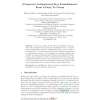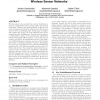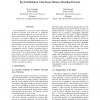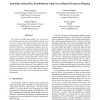85
Voted
WS
2006
ACM
15 years 7 months ago
2006
ACM
We introduce Integrity (I) regions, a novel security primitive that enables message authentication in wireless networks without the use of pre-established or pre-certified keys. ...
TCC
2007
Springer
15 years 7 months ago
2007
Springer
Abstract. A protocol compiler is described, that transforms any provably secure authenticated 2-party key establishment into a provably secure authenticated group key establishment...
IMA
2007
Springer
15 years 7 months ago
2007
Springer
Key establishment between two parties that uses only one message transmission is referred to as one-pass key establishment (OPKE). OPKE provides the opportunity for very efficient ...
123
click to vote
CCS
2007
ACM
15 years 7 months ago
2007
ACM
Wireless sensor nodes generally face serious limitations in terms of computational power, energy supply, and network bandwidth. Therefore, the implementation of effective and sec...
109
click to vote
MOBIQUITOUS
2007
IEEE
15 years 7 months ago
2007
IEEE
Key establishment is one of the major challenges in Wireless Personal Area Networks, as traditional security mechanisms often do not cope with the dynamic characteristics of wirel...
127
click to vote
ICON
2007
IEEE
15 years 7 months ago
2007
IEEE
Key establishment plays a central role in authentication and encryption in wireless sensor networks, especially when they are mainly deployed in hostile environments. Because of th...
105
click to vote
SP
2008
IEEE
15 years 7 months ago
2008
IEEE
We consider the following problem: how can two devices that do not share any secrets establish a shared secret key over a wireless radio channel in the presence of a communication...
85
Voted
ITNG
2008
IEEE
15 years 7 months ago
2008
IEEE
— Because of limited resources at sensor nodes, sensor networks typically adopt symmetric-key algorithms to provide security functions such as protecting communications between n...
129
Voted
CNSR
2008
IEEE
15 years 7 months ago
2008
IEEE
Key establishment plays a central role in authentication and encryption in wireless sensor networks, especially when they are mainly deployed in hostile environments. Because of t...




